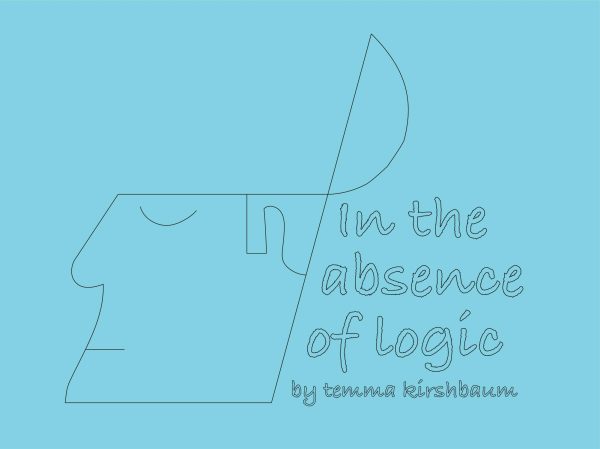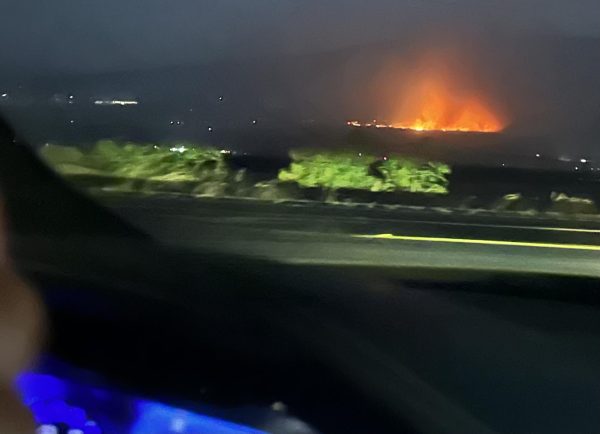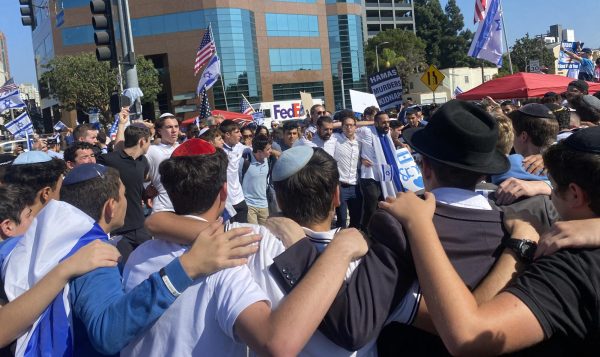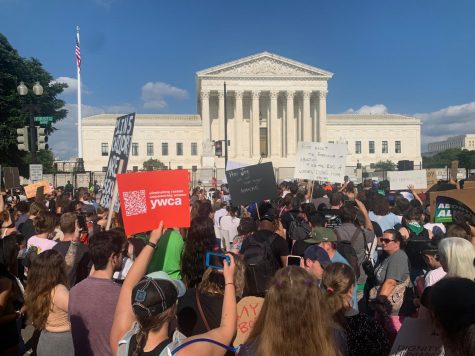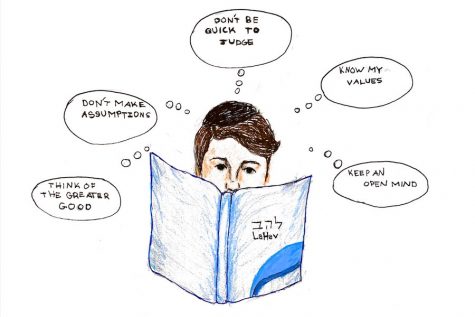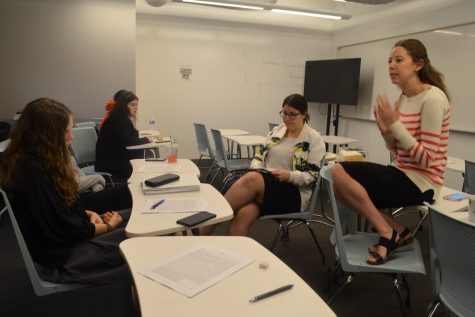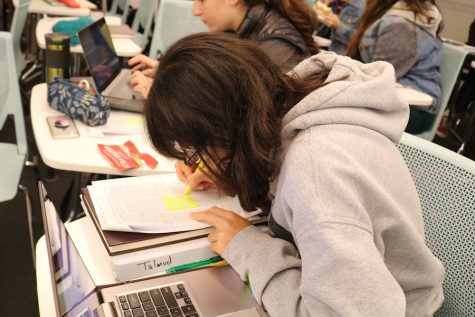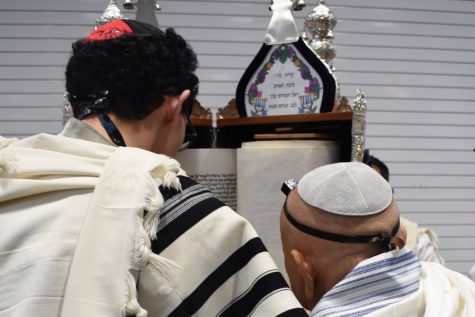School makes LGBT inclusion official policy, hoping to set an example for Modern Orthodox schools
Photo illustration by Gabe Silverstein
TEXT: The 18th verse of Vayikra (Leviticus), above, calls it an “abomination” to “iie with a man as one lies with a woman.” Rabbi Segal said that does not mean gay students should not be able to participate fully in religious life at school and beyond.
Hoping to start a trend that will spread throughout Orthodox Judaism, Shalhevet has adopted a six-point LGBT non-discrimination pledge, co-written by Head of School Rabbi Ari Segal and openly gay 12th-grader Micha Thau.
It’s a new idea they hope will address what Rabbi Segal has called the biggest challenge to emunah – religious belief – in the religious world today, by ensuring that LGBT students are accepted at their schools and ensuring all students are treated equally.
In the pledge, Rabbi Segal promised to not discipline any student because of his or her sexual orientation, to not preclude LGBT students from any religious activities at school, and to connect LGBT students to any necessary support services, among other things. A generic version of the pledge can be viewed online at jewishschoolpledge.com, a new website, and was announced to the Shalhevet community in a Sept. 30 email from Rabbi Segal.
For two years [Micha] was worried whether he would be kicked out, expelled, whether we would tell him he couldn’t be a gabbai or daven or lain, he just had no idea
— Rabbi Ari Segal, Head of School
In his email he referred to a Sept. 29 article in the Jewish Journal, where Micha wrote about being Orthodox and gay.
“I wish to call your attention to the pledge that Micha references in his article, one that he co-authored together with us and one which we hope will establish a precedent for schools like ours across the nation,” wrote Rabbi Segal.
Rabbi Segal does not yet know if the pledge will be added to the student handbook or if it will be presented to the students at Town Hall, but he believes it will always be a part of Shalhevet. As of Oct. 11, it had not been published on the school’s official website.
“While the pledge is not a legal document, I absolutely believe that the school will abide by it when I leave the school,” said Rabbi Segal in an email interview with the Boiling Point from Israel, where he is spending the holiday period with his family.
“This pledge is not about me – it is about the values of tolerance, respect and support that the school espouses and believes in deeply,” Rabbi Segal wrote. “It is a core part of Shalhevet’s mission and that won’t change – ever.”
Shalhevet Board President Fred Toczek said the pledge was an administrative action and did not require board approval. But he said there was “widespread support” for the pledge on the board.
“It’s not something that is subject to board approval or disapproval, but there is wide-spread support,” said Mr. Toczek in an interview.
The pledge was announced two weeks after Rabbi Segal addressed the challenge faced by LGBT Jews in an article on shalhevetboilingpoint.com, and just days after the school’s new Gay-Straight Alliance met for the first time.
“As they go off to college, students invariably face the painful moral dilemma created by the seemingly intractable conflict: believing in the primacy and validity of the Torah on the one hand, and following their hearts’ sense of morality with regard to loving and accepting their gay friends – or perhaps “coming out” themselves—on the other,” wrote Rabbi Segal.
Micha, in his Jewish Journal article, described struggling before coming out.
“My religion, my family, my friends, my presence at my school, would, in my mind, all be in serious jeopardy if I dared to reveal the truth to anyone,” wrote Micha.
Rabbi Segal signed the pledge, co-created by senior Micha Thau, Rabbi Segal and the Orthodox LGBT support group Eshel, so that LGBT students would know that they are accepted at Shalhevet.
“We’re very supportive and tolerant, but if our students don’t know and they live in fear then we haven’t done everything we can, so we decided to develop this pledge,” said Rabbi Segal. “If there are students in your school who are scared and don’t know where the school stands, that’s not a place where students, those students at least, can be their best selves, can do their best learning.”
We’re trying to make something that a lot of Jews can agree on, and it’s very difficult.
— Micha Thau, 12th grade
“One of the reasons that I didn’t come out was because I didn’t know how my school would react,” said Micha in an interview with the Boiling Point. “So I thought maybe if I had the school and other schools put out these commitments that they wouldn’t expel kids who came out of the closet, or harass or discriminate against them, then more kids would be apt to come out of the closet.”
While Micha struggled, Rabbi Segal thought it was obvious that Shalhevet would be accepting.
“For two years he was worried whether he would be kicked out, expelled, whether we would tell him he couldn’t be a gabbai or daven or lain, he just had no idea,” said Rabbi Segal in an interview. “I just assumed that he, that everyone, took for granted that of course we wouldn’t kick a student out, of course the student could be fully participatory in everything we do.”
Micha, too, thought it was necessary for Shalhevet to be proactive about its stance.
“This is important, because there is a real danger in preventing kids from coming out,” said Micha. “If you didn’t make your decision clear, you make that person afraid, and if you make that person afraid, they may wind up doing something that is going to harm them or harm other people or both.
“By making your position clear, you let other people know that this is a safe environment for them.”
Other elements of the six-part pledge are an agreement that sexual orientation cannot affect a potential student’s application for admission; a promise not to permit any student, teacher or administrator to discriminate; and a stipulation that Shalhevet will not refer students to “reparative” or “conversion” therapy.
The pledge also advocates sponsoring a GayStraight Alliance (GSA) club on campus, and Rabbi Segal announced the creation of a GSA in Town Hall on Sep. 22.
The pledge also has an ambition: to have other schools sign off on these or similar standards or create their own version of a pledge.
“Different things work for different schools and none of us are trying to impose our vision of the pledge on any other school,” said Rabbi Segal. “What we want to encourage other schools to do and other communities to do is to make their own pledge or have their own conversation on this issue.
“We should celebrate schools and communities that have the conversation cause for some communities it is much harder to have the conversation,” he added.
Micha, who created the new pledge website himself in anticipation of Rabbi Segal’s announcement, said the pledge was created for a religiously diverse group of schools and certain concessions that he didn’t mind under the circumstances. Definitions of religious activities and incorporating the words “gender identity” along with “sexual orientation” in the pledge would have been better, he said.
“The reason is that language makes people feel very uncomfortable, and we want to reach the widest breadth of schools and institutions,” said Micha. “It’s just more to work on for the future. We’re trying to make something that a lot of Jews can agree on, and it’s very difficult.”
Eshel has already been in contact with at least one other school, according to Micha, but neither Rabbi Segal nor Micha plan on actively advertising the pledge. Instead, they think the pledge will sell itself.
“We think we will have parents going up to the school and saying ‘sign this,’” said Micha.
Rabbi Segal agreed that Shalhevet’s pledge would inspire people to take action, but he did not rule out the possibility of changing strategies if the pledge does not initially succeed.
“If it doesn’t seem to be working, obviously we’ll change our approach,” Rabbi Segal said.
This story won Second Place in News Reporting in the 2017 Gold Circle Awards of the Columbia Scholastic Press Association.
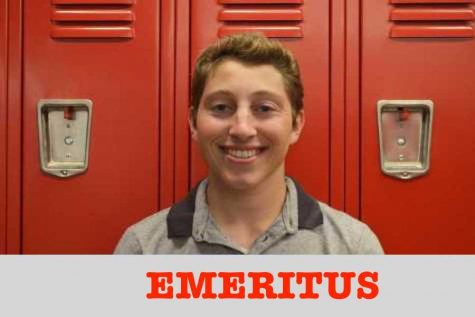
Since freshman year, Alec Fields has written numerous stories for the Community, Torah, Features, Outside News, Sports and Arts and Culture sections. In 10th grade, Alec received the post of Torah editor and held that position until being named co-Editor-in-Chief for the 2016-2017 school year. He has received awards for, "SUMMER OF WAR: Hollywood, too, was divided," “Refusing Playoff Suspension, Buckley Resigns,” “OUT OF THE SHADOWS: Ancient tradition meets modern sensibility,” and for “Rabbi who sauna-ed with students in New York was scholar-in-residence at Beth Jacob on Shavuot.” Alec is co-captain of Model Congress, co-president of the Finance Club, a founder of Supplies on Demand, a member of the Mock Trial team, Firehawks for Israel, tennis team and grappling club. Some of his favorite classes are Political Theory of Modern Middle East, Psychology, and Government and Economics. When Alec has time he enjoys playing or watching sports, reading...




